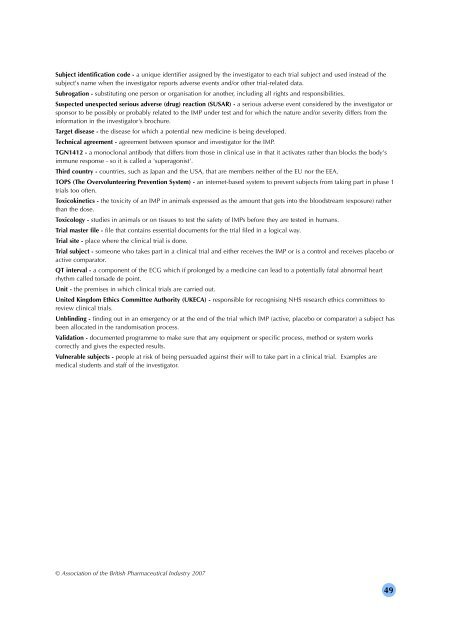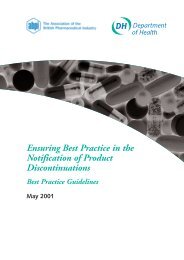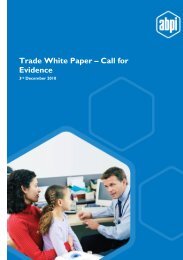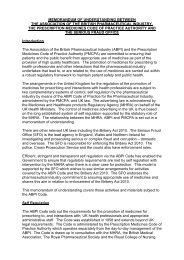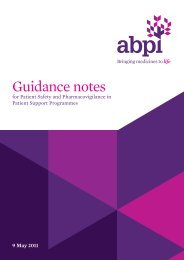ABPI Guidelines for Phase 1 Clinical Trials (PDF
ABPI Guidelines for Phase 1 Clinical Trials (PDF
ABPI Guidelines for Phase 1 Clinical Trials (PDF
Create successful ePaper yourself
Turn your PDF publications into a flip-book with our unique Google optimized e-Paper software.
Subject identification code - a unique identifier assigned by the investigator to each trial subject and used instead of the<br />
subject's name when the investigator reports adverse events and/or other trial-related data.<br />
Subrogation - substituting one person or organisation <strong>for</strong> another, including all rights and responsibilities.<br />
Suspected unexpected serious adverse (drug) reaction (SUSAR) - a serious adverse event considered by the investigator or<br />
sponsor to be possibly or probably related to the IMP under test and <strong>for</strong> which the nature and/or severity differs from the<br />
in<strong>for</strong>mation in the investigator's brochure.<br />
Target disease - the disease <strong>for</strong> which a potential new medicine is being developed.<br />
Technical agreement - agreement between sponsor and investigator <strong>for</strong> the IMP.<br />
TGN1412 - a monoclonal antibody that differs from those in clinical use in that it activates rather than blocks the body's<br />
immune response - so it is called a 'superagonist'.<br />
Third country - countries, such as Japan and the USA, that are members neither of the EU nor the EEA.<br />
TOPS (The Overvolunteering Prevention System) - an internet-based system to prevent subjects from taking part in phase 1<br />
trials too often.<br />
Toxicokinetics - the toxicity of an IMP in animals expressed as the amount that gets into the bloodstream (exposure) rather<br />
than the dose.<br />
Toxicology - studies in animals or on tissues to test the safety of IMPs be<strong>for</strong>e they are tested in humans.<br />
Trial master file - file that contains essential documents <strong>for</strong> the trial filed in a logical way.<br />
Trial site - place where the clinical trial is done.<br />
Trial subject - someone who takes part in a clinical trial and either receives the IMP or is a control and receives placebo or<br />
active comparator.<br />
QT interval - a component of the ECG which if prolonged by a medicine can lead to a potentially fatal abnormal heart<br />
rhythm called torsade de point.<br />
Unit - the premises in which clinical trials are carried out.<br />
United Kingdom Ethics Committee Authority (UKECA) - responsible <strong>for</strong> recognising NHS research ethics committees to<br />
review clinical trials.<br />
Unblinding - finding out in an emergency or at the end of the trial which IMP (active, placebo or comparator) a subject has<br />
been allocated in the randomisation process.<br />
Validation - documented programme to make sure that any equipment or specific process, method or system works<br />
correctly and gives the expected results.<br />
Vulnerable subjects - people at risk of being persuaded against their will to take part in a clinical trial. Examples are<br />
medical students and staff of the investigator.<br />
© Association of the British Pharmaceutical Industry 2007<br />
49


